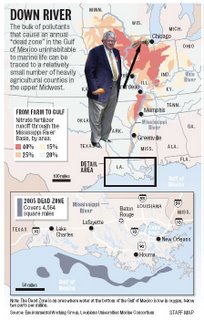
Dennis "It looks like a lot of that place could be bulldozed," Hastert, via his 14th Congressional District--helpfully superimposed on the map above (map courtesy of the Pic) continues to spit in the eye of the Gret Stet:
Louisiana's fishing industry faces an uncertain future after the pounding it took last hurricane season, but fishers know one thing is certain: Sometime this summer, a lifeless expanse of water about the size of Connecticut -- maybe a little bigger, maybe a little smaller -- will form off the state's coast.
And there's no point fishing it, because any nets dragged there are sure to come up empty.
Five years after a multistate compact was signed to rein in the sprawling "dead zone" of low-oxygen water that forms annually in the Gulf, the problem has only grown worse, according to federal and state officials and independent scientists. Voluntary incentives to cut down on the pollutants that cause it, particularly fertilizers carried by the Mississippi and Atchafalaya rivers from upstream farms, have failed to put a dent in the largest ecological threat to one of the world's most productive fisheries.
Meanwhile, a new study has traced almost 80 percent of the nitrogen-based fertilizers largely responsible for the low-oxygen zone to a relatively small number of agricultural counties in the Midwest that are heavily subsidized by the federal government to grow their crops.
The study from the Environmental Working Group in Washington says conservation programs intended to offset the runoff of fertilizers from farms have come up woefully short. In some of the counties highlighted by the study, the group said, for every $500 that goes into subsidy programs that could increase fertilizer use, a scant $1 is spent on conservation programs.
To be fair, Denny's district isn't the only culprit; however, this story underscores our national interdependence and further demonstrates cause for a national committment to the Gulf Coast...not to mention the fact that those areas SENDING toxic waste down to us are prone to flooding, too. Maybe Dennis should think about bulldozing most of western Illinois if he so keen about people not living in flood prone regions.
Or maybe Louisiana should insist that the Midwest keep their toxins up in the Midwest instead of expecting us to deal with them.
No comments:
Post a Comment